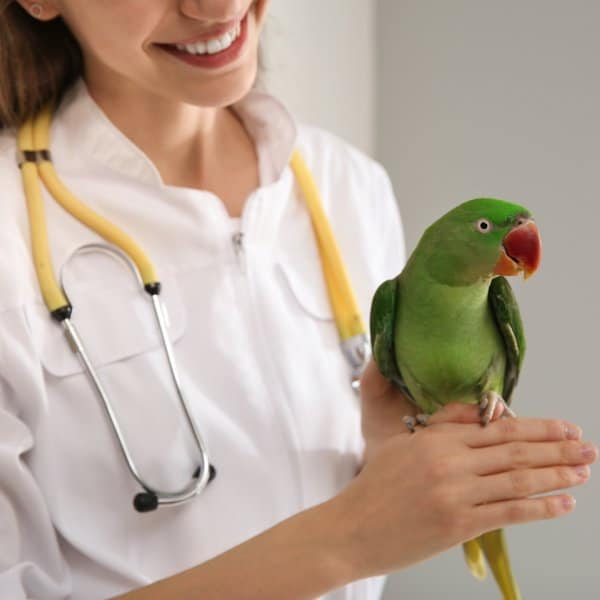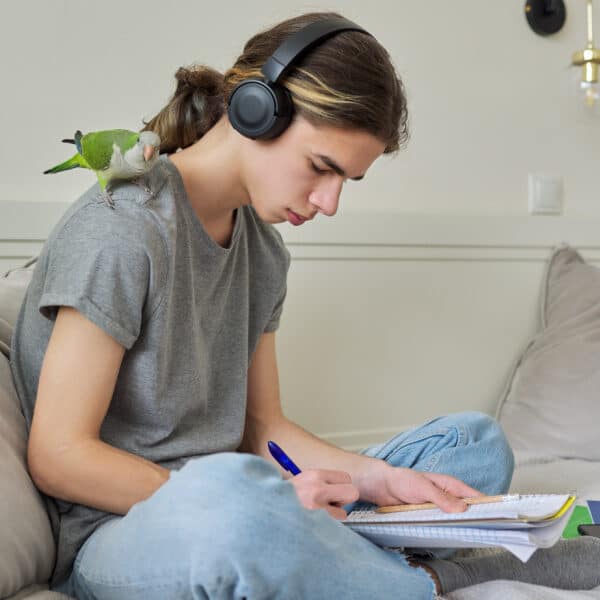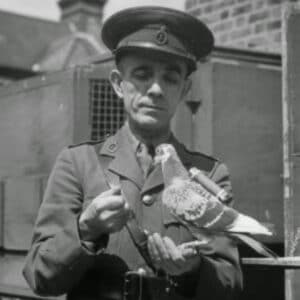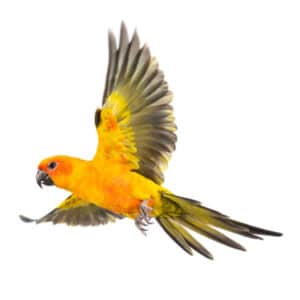I had to jump in and provide a voice on the other side. I remember reading this article last month about keeping birds flighted and feeling very conflicted.
My friend’s green cheek conure, who often came to visit, was fully flighted, while my own green cheek is not– our respective choices. His bird, despite being able to follow us, humans, everywhere, was a screamer anyway and mine is not.
Both were playful and spoiled, so it’s hard to say what causes behaviors with any certainty. My main point is this: His bird was quite the nimble flyer, but yesterday it hit a window in his home and died on impact.
What on earth is a bird owner to do in a large house, for example, when no quantity of decals is enough to cover them all?
It’s unreasonable to expect most owners to be able to adequately bird-proof the entire space, and so CAREFUL wing-trimming to limit distance and speed is the far more humane solution we’ve come up with.
I worked with several respected avian vets and experts, and they agreed that most homes just aren’t safe enough no matter what we do, but we can’t all build giant aviaries.
A Better Bird Ep 13 How Bird Proof Is Your Home ~ Video
Wing trimming does not seem to limit the quality of life at all for my own little guy– he is out on his various play stations all the time and goes everywhere with me at home, from room to room. If my friend had followed suit, his would still be alive. So I think my mind is made up.
Editors note: I’m the guy whose cockatiel followed him around a 65-foot long apartment for 3-1/2 years without one incident.
Let’s start at the beginning
hu·mane
(h)yo͞oˈmān/ adjective
- having or showing compassion or benevolence.
- “regulations ensuring the humane treatment of animals”
Chopping any body part off any animal or any human is not humane – I’m sorry.
The blood may have left the feather but the feather is still anchored to the skin controlled by muscles – it’s still a living organism that you have removed from the animal.
A bird that has lost the ability to fly has a diminished quality of life they are – handicapped.
If you are clipping your bird properly you are clipping the largest feathers on its body.
All birds preen – have you asked it how it’s dealing with 20 feather shafts that been rudely and abruptly terminated?
No, I don’t think it’s unreasonable to expect most bird owners to be able to adequately bird-proof their entire space.
I do think it’s reasonable to limit the room(s) the birds are in much like grandparents limit certain rooms to grandchildren.
Your arguments are putting the whole burden on the bird and the bird isn’t the problem it’s the human.
Statistically, floor walking birds are five times more likely to get stepped on than a flying bird getting killed upon impact with a vertical surface BECAUSE WE LOPPED OFF ALL THEIR WINGS!
We don’t have ANY decals on our windows in the two big rooms that my bird flies around in but I, like my neighbors and friends (thankfully) all have shades – shutters – curtains and blinds that all can easily be closed when a flighted bird is out.
Birds are smart you can train them where to fly and where not to fly.
How many minutes or hours have you spent this week this month or this year on clicker training your bird?
How often have you weighed your bird?
When you get a moment please forward me the literature written by several respected avian vets and experts, and they agreed that most homes just aren’t safe enough no matter what we do, so I can publish it all here on this blog.
I’ve never met a disrespected avian vet – and there’s not a whole lot of experts on exotic birds today – the air is pretty thin.
So is mine.
I want to return this bird.
Why is that?
It can’t fly.
Gee, I’m sorry about that. We’ve never taken back a dog that couldn’t walk.
New topic – birds and candles
Thanks, Mitch, a very good topic that I thought I was up on… but “the German study” was the last I’d heard.
Many years ago I had a party and burned tons of candles all night. Once in bed, the carbon monoxide alarm went off and I called the fire company.
When they were in, one turned to the parrots and said, Well you know the level isn’t too bad because they’re still standing.
Obviously, I don’t want to use my guys as a detector, and I’ve never lit many candles at once again. I also seek soy-based candles (about the only thing soy is good for, IMHO) vs. paraffin.
I’m so sorry to hear of Enki’s owner’s illness, and I hope she will look into the other home-based sources of irritants like those you suggested. Sending prayers for you.
Editorial:
Candles have no place in a home with birds – In 1842, Julius Robert Mayer discovered the “Law of Conservation of Energy”.
In its most compact form, it is now called the First Law of Thermodynamics: energy is neither created nor destroyed.
In layman’s terms – for a candle to produce heat and light energy it needs fuel which is the (paraffin) wax and the oxygen in the air.
Every candle lit in the same room regardless if they are “bird-safe” the candle(s) is depleting oxygen in that room.
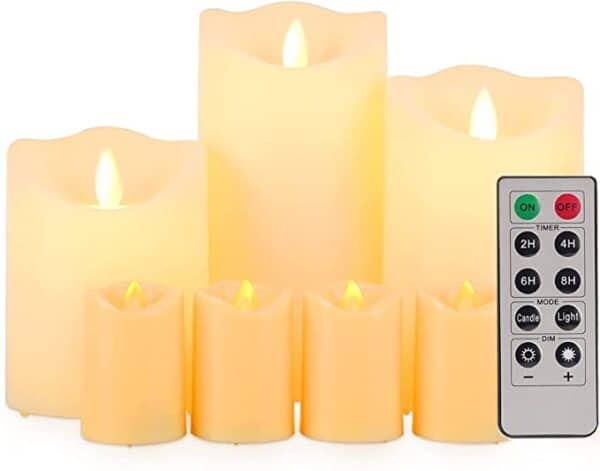
The only bird-safe candle we know of ~ battery operated
I have no scientific evidence but – much like dogs that can sniff out human tumors and explosives the size of a grain of sand packaged tightly in luggage, I believe in my heart of hearts birds can feel the diminished oxygen from a single candle flame.
Most candles usually do not lead to a bird’s death but are probably instrumental in reducing the quality of life for the animal while lit.
Written by Mitch Rezman
Approved by Catherine Tobsing
Your Zygodactyl Footnote
Ha, when I saw the perch video this morning, I thought, “That’s more like it.” Hearing about Bacon allowing to be grabbed to change cages and grabbed for a shower attempt said terrified budgie to me, not cooperative budgie.
Bacon’s continued aloof attitude and resentment of hands in the cage to adjust perches and whatnot is the typical behavior right now.
A budgie is indeed not a cockatiel, and can take a VERY LONG time to accept new surroundings, especially being alone ie “flockless”.
This is why budgies are so undervalued and why people are easily disappointed in them when they bring them home and get only “budgie statue” mode for a long time. But budgies are not antisocial, dumb, or boring.
Given time and patience, slow movements, and careful reintroduction of the hand, as a clearly frustrated Mitch is attempting, they will return to their happy, playful, smart, singing, charming, sassy selves.
Patience is the only way with budgies, period, but it will be rewarded. I read aloud to mine, even if it was the newspaper, just to get each used to my voice, and they still enjoy being read a story!
No, Bacon will never be that wonderful and dearly missed ambassador, Princess Popcorn, but he’ll be a delightful Prince Bacon, given the chance he deserves. He’s in such good hands, just don’t handle him! Yes, “let’s place the burden of bird behavior on humans, not birds.”
Catherine, I do have a question for you. Do you know why some birds like to dunk their food in water? I have a two-year-old budgie that just started to dip her oat groats in her water, even though she has to go back and forth across the cage each time to do so, and she drinks plenty of water in general.
I’m just wondering if this is indicative of something in particular, as nothing else in her lifestyle seems changed. The oats are not colored and she doesn’t do it with pellets or other seeds. Thanks for any opinion.
Author Profile
Latest entries
 Feeding Exotic BirdsDecember 29, 2025How to Switch or Convert Your Bird From Seeds to Pellets: Real-Life Case Studies and Practical Guidance
Feeding Exotic BirdsDecember 29, 2025How to Switch or Convert Your Bird From Seeds to Pellets: Real-Life Case Studies and Practical Guidance Feeding Exotic BirdsDecember 16, 2025A Practical, Budget-Smart Guide to Feeding Birds Well
Feeding Exotic BirdsDecember 16, 2025A Practical, Budget-Smart Guide to Feeding Birds Well Bird EnviornmentsDecember 7, 2025Understanding Budgie Cage Bar Orientation: Myths, Realities & Practical Solutions for Vertical-Bar Bird Cages
Bird EnviornmentsDecember 7, 2025Understanding Budgie Cage Bar Orientation: Myths, Realities & Practical Solutions for Vertical-Bar Bird Cages Feeding Exotic BirdsDecember 5, 2025How Dr. T.J. Lafeber Rewrote the Future of Pet Bird Nutrition
Feeding Exotic BirdsDecember 5, 2025How Dr. T.J. Lafeber Rewrote the Future of Pet Bird Nutrition
